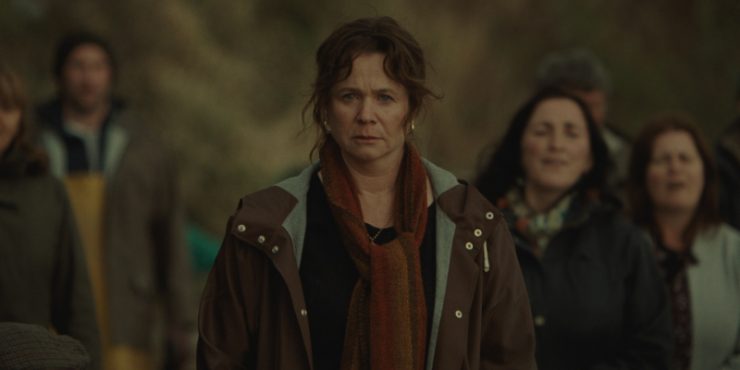In the windswept, coastal Irish village that is the setting of God’s Creatures, harshness is a part of everyday life. We never learn what the town is called. The sky is a permanent gray and the ocean tide that laps the shores is hostile and uninviting. Early in the film, a young man’s body has been brought to shore, drowned after trying to catch fish in the off hours. The economy in this micro-community depends on the fish and oysters that the sea provides, but this same sea will take as quickly as it gives. This is the tacit deal that everyone has agreed to. Everyone includes Aileen O’Hara (an incredible Emily Watson), the shift manager at a local factory that appears to employ all of the town’s women. She toils on the assembly line, checking oysters, funneling through the fish. There is not much to look forward to.
This changes with the return of Brian (Paul Mescal), her adult son who’s lived abroad for many years. Living in an unknown part of Australia without a single word of his health or circumstance, Aileen doesn’t have the energy to castigate him for his absence. She’s overcome with happiness to have him back. Brian’s father, Con (Declan Conlon), and his sister, Erin (Toni O’Rourke), are less enthusiastic. Brian’s reappearance also brings back unspoken transgressions from the past, a tension that wained – but never evaporated – while he was gone. Brian wants to move back home and resurrect the long-dead oyster farm that was owned by the family. It will take a lot of work, Con reminds his son with a note of skepticism that Brian can live a life on the straight and narrow.
For Aileen, Brian provides a much-needed jolt within the desolation of her day-to-day. She adores her son and he welcomes her adoration. She even goes as far as to steal oysters from the factory to give him a head start on the farm. The prospect of Brian’s success is such a glowing one that she’s willing to undermine its legitimacy just to ensure that it actually happens. Throughout the town, many others are happy to see the charming Brian come home, spending time in the local tavern that serves the entire town’s after-work population. This includes Sarah Murphy (Aisling Franciosi), a fellow factory worker and songstress whose own life of domestic abuse continues the tradition of the town’s inclement treatment of its women. With Brian’s return, the town feels almost reanimated, given a tinge of nostalgia the brightens their minds. That is, until an accusation is made and the fragile construct begins to fall apart.
Midway through the film, Aileen is asked a direct question by a police officer regarding Brian. Without thinking, she responds in a way that protects her son, knowing immediately that it’s a lie. It’s in this moment where the simplicity of Aileen’s life is thrown into a complex whirlwind of Dostoevsky-ian proportions. Directed by Saela Davis and Anna Rose Holmer (director of the great 2015 film, The Fits), God’s Creatures plays out like a moral parable by way of a taut thriller. Aileen knows from the moment she says it that what she’s done is wrong, but Creatures meticulously documents her psychological torment as the gravity of the situation makes itself known. Protecting Brian took no thought at all but coming to grips with the reality of him and the village might take everything that she has.
A pulsating, cacophonous score from Danny Bensi and Saunder Jurriaans ratchets up the suspense (and may casually remind some of Jonny Greenwood’s work on There Will Be Blood), but God’s Creatures‘ specialty is when it chooses to be totally quiet. The most powerful image in the film is Emily Watson’s face. The veteran English actress is given her greatest role in decades, rationalizing and then internalizing the roiling emotions as she faces an impossible choice. That agreement everyone has made with the village, does that not include the misdeeds of her son? Must his sin pay the price for generations of abuse and manipulation? Davis and Holmer frame this journey perfectly, framing Watson often in tight close-up, showing an external stoicism with an internal torture.
This is a patient film that takes its time building the atmosphere of its setting, but it is also edited (by Jeanne Applegate and Julia Bloch) with the tightness of a thriller, with all the suspense of a true crime story without any of the easy conclusions. There is no choice Aileen could make that could satisfy her sense of dread, and that is the basic conceit of the script (by Shane Crowley). Cinematography from Chayse Irvin both enlivens the film with gorgeous landscapes but still reinforces the bleak, shadowy nature of the film’s setting and tone. It’s a properly gothic tale of a community that can accept that the sea can be a cruel master. When they’re face to face with how cruel their fellow man can be, things get much more complicated. This is one of the best films of the year.
Directed by Saela Davis and Anna Rose Holmer










